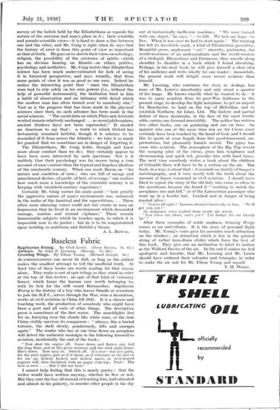Baseless Fabric
Sagittarius Rising. By Cecil Lewis. (Peter Davies. 8s. 6d.) Airdays. By John F. Leeming. (Harrap. 7s. 6d.) Growing Wings. By Filson Young. (Michael Joseph. els.)
AUTOBIOGRAPHIES can never be dull, so long as the author makes the smallest attempt to tell the unofficial truth. At least two of these books are worth reading for that reason alone. They make a sort of epic trilogy as they stand in order at the top of this review ; an epic of that kind of visionary
lunacy- which keeps the human race worth belonging to, with its itch for the still vexed Bermoothes. Sagittarius Rising is the history of a boy who leaves Oundle at seventeen to join the R.F.C., serves through the War, wins a decoration, works at civil aviation in China till 1921. It is a sincere and
touching work, the production of somebody who might have been a poet and all sorts of other things. The descriptive prose is sometimes of the first water. The searchlights live for us, hurrying over the clouds like white mice, or the true China visibly survives its conquerors : " always, like a buried tortoise, the shell slowly, ponderously, lifts and emerges again." The reader who has at one time flown an aeroplane will detect the authentic nostalgia in the following farewell to aviation, incidentally the end of the book :
" Now shut the engine off. Come down and flatten out, feel the long float, and at the given moment pull the stick right home. She's down. Now taxy in. Switch off. It's over—but not quite, for the port engine, just as if it knew, as if reluctant at the last to let me go, kicked, kicked, and kicked again, as over-heated engines will, then backfired with an angry snorting : Fool ! The best is over . . . But I did not hear."
I cannot help feeling that this is nearly poetry : that the writer would have written anyway, whether he flew or not. But they sent the boy off instead of teaching him, half educated and almost in his puberty, to murder other people in the sky out of fantastically inefficient machines. " We were trained with one object," he says, " —to kill. We had one hope—to live. When it was over we had to start again." The training has left its inevitable mark, a kind of Elizabethan juvenility.
Beautiful prose, unpleasant " art," sincerity, pretension, the world-weariness of an undergraduate and the world-wisdom of a biologist, Bloomsbury and Parnassus, they wrestle along shoulder to shoulder in a book which I found absorbing. Perhaps, in his next book, he will give himself a clear idea of his audience and write wholly for one reader : meanwhile, the present work will delight more recent aviators than himself.
Mr. Leeming, who continues the story in Airdays, has none of Mr. Lewis's uncertainty and only about a quarter of his range. He knows exactly what he wanted to do : it
was to carry aviation from its post-War doldrums to the present stage, to develop the light aeroplane, to get an airport for Manchester, to land on the top of Helvellyn, and to establish Northern Air Lines, Ltd. The history and partial failure of these desiderata, in the face of the most terrific odds, carries one forward irresistibly. The author has written two other books, one on gardening and one on bees. An apiarist who can at the same time run an Air Circus must certainly have been touched by the hand of God, and I should like to quote at some length from this good-humoured, un- pretentious, but pleasantly lunatic record. The gipsy has come into aviation. The atmosphere of the Big Top covers the camping pilot of the circus, gives him toughness and showmanship and quick wit, provides him with hard times. The next time somebody writes a book about the children of Grimaldi there will have to be a section on the air. The book, in a way, is about that : it reminds me faintly of Sanger's autobiography, and it very nearly tells the truth about the amount of liquor consumed in civil aviation. I should have liked to repeat the story of the old lady who came so often to the aerodrome because she found it " soothing to watch the aeroplanes rise and fall," or of the Lancastrian passenger who went up in a bowler hat. Crashed and in danger of being roasted alive :
" ' You're all right ! ' Lawson shouted frantically to him. We'll get you out!'
An indignant voice replied from inside the wreck.
You leave me alone, can't yer ? I'm lookin' far me bloody 'at.' "
After these examples of noble madness, Growing Wings
comes as an anti-climax. It is the story of personal flight
today. Mr. Young's voice gave his accounts much attraction on the wireless ; an attraction which is lost in the printed string of rather hum-drum cliches which form the text of this book. They give one an inclination to label its author
as the Walford Davies of the air. In the end it makes me feel apologetic and humble, that Mr. Leeming and Mr. Lewis should have endured their calvaries and triumphs, in order to make the air safe for Mr. Filson Young and myself.
T. H. WHITE.






































 Previous page
Previous page